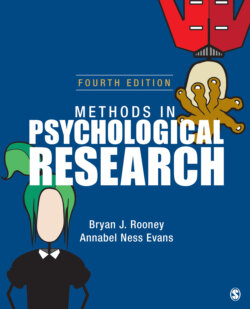Читать книгу Methods in Psychological Research - Annabel Ness Evans - Страница 37
На сайте Литреса книга снята с продажи.
Why We Do Research To Evaluate a Theory
ОглавлениеIn psychology, theories abound. Theories, if they are good theories, generate testable hypotheses. Good theories allow us to test the hypotheses derived from them. Bad theories often do not. In fact, one criterion of a good theory is whether testable hypotheses can be postulated. A great deal of research in psychology is conducted to evaluate current theories about human behavior. In a classic article, Darley and Latane (1968) offered a theory about why the many people who could hear, from their apartments, a young woman being attacked outside did nothing to help her. They postulated that the responsibility to be good citizens was diffused among the many people, and as a result, no one person felt compelled to help. One hypothesis that can be derived from this theory (called the bystander effect) is that the greater the number of people present, the less likely any one person is to help someone in distress. And, indeed, this hypothesis has been confirmed in numerous experiments.
Let’s look at another example. Developmental psychologists call the emotional bond between children and their primary caregivers attachment. But why does this happen? Behaviorists proposed that attachment develops because the primary caregiver, usually the mother, is associated with food, a strong positive reinforcer to hungry babies. Harlow and Harlow (1966) tested this theory in a classic set of studies. Their results did not support the behaviorists’ claim. Contact comfort, not feeding, was shown to be the source of attachment, at least in rhesus monkeys.
Theories provide a wealth of ideas for research topics.
